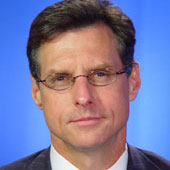Pick Your Surprise for 2004
What surprises await the global economy in 2004?
January 19, 2004
Reaching from the hopeful to the frightening, here are 10 possible scenarios for 2004:
Solid economic growth combines with low inflation in the United States to reenact the Goldilocks era of the late 1990s.
An economic backdrop — neither too hot nor too cold — fuels investor confidence, boosts earnings and fluffs up returns to 20% and more for the major market indices in 2004.
The U.S. economy overheats, forcing the Federal Reserve to raise interest rates as early as April 2004.
Sectors most sensitive to changes in interest rates — such as autos and housing — are hammered, bringing closure to a three-year boom in auto and housing sales.
Small- and medium-cap stocks fall as the cost of capital rises and investors become more risk-adverse. All of the major market indices post declines for the year.
One of the world's fastest-growing economies falls victim to a surge in nonperforming loans and general banking crisis that yields numerous corporate failures. There is also a spike in unemployment and interest rates — and a steep dive in China's financial markets.
The world feels China's pain: Global commodity prices plunge, stressing major commodity producers, such as South America, South Africa, Australia, Canada and the Middle East.
Developing Asia experiences a sharp decline in exports to China and lower growth as a result. And finally, leading U.S., European and Japanese multinationals all suffer lower sales to China — which crimps their earnings growth.
After a three-year hiatus, mergers and acquisitions stage a strong comeback. Low interest rates, higher share prices, improved corporate profits and greater risk taking among CEOs spark more M&A deals.
M&A activity is notably strong in sectors like financial services, pharmaceuticals and telecom equipment and services. The big winners are banks and brokerage houses as another round of M&A activity kicks off.
Saudi Arabia becomes engulfed in civil war, prompting U.S. military intervention.
World oil prices soar, as do U.S. military expenditures and other war-related costs.
Anti-American sentiment in the Arab world rises, heightening concerns about future acts of terrorism.
The threat to Saudi Arabia's oil reserves — and the prospect of increased terrorist activity — drives up the price of gold and other precious metals.
Europe's grand experiment towards fiscal discipline fails. Fiscal overspending is back — with the expectation of even larger budget deficits.
Consequently, the euro drops by 15% to 20% against the dollar. U.S. investors banking on a weak dollar to bolster their European returns are greatly disappointed.
The United States peacefully transfers power in Iraq, allowing for a much-reduced U.S. presence in the nation.
Osama bin Laden is captured and outcasts like North Korea, Iran and Libya become more politically and economically aligned with the interests of the United States and Europe.
The 2004 Summer Olympics take place in Athens without a hitch. Oil prices fall and investor confidence strengthens as the threat of terrorism fades.
The Doha round of world trade talks collapses in 2004, raising the specter of surging global protectionism. The U.S. dollar weakens, as do the numerous currencies of emerging markets dependent on global trade.
The end of globalization is declared. Stocks of U.S., European and Japanese multinationals all decline. Wall Street's 2004 forecast that big-cap multinationals will lead the way is snuffed.
Japan fails to rebound yet again, while Europe remains mired in a slow recovery. Growth in the emerging markets decelerates. The upshot: The global economy remains dependent on the United States.
As the world's solo growth engine, America sees its current account deficit soar to 6.5% of GDP, triggering a run on the U.S. dollar.
Rising U.S. protectionism in light of record trade deficits further undermines investor confidence in U.S. dollar-denominated assets and the U.S. dollar. Global equity prices fall in tandem, although the U.S. markets underperform relative to other global indices.
The Republicans stumble, the Democrats find their footing, and — heading into October 2004 — the presidential election is too close to call. President Bush runs neck-and-neck with Democratic presidential nominee Howard Dean.
Given election uncertainty, investors take large sums of money off the table. The major indices, after having posted solid gains during the first half of the year, give them all back in the run up to the November 2004 election.
This text is adapted from a January 6, 2004, Market Analysis by Joseph Quinlan, Managing Director and Chief Market Strategist at Bank of America.
Read previous
Food Security and Globalization
January 17, 2004
